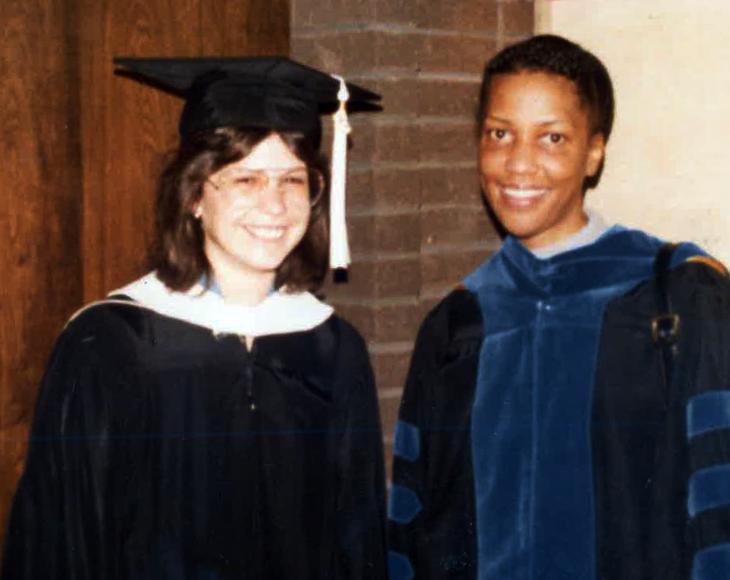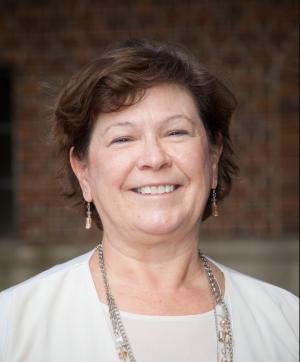A few years back, Mary (Garvey) Verrill ’78 noticed a lot of schools across the country had been named after Thea Bowman, FSPA ’65. She also noticed there weren’t any books suitable for younger readers about Sr. Thea. That needed to be remedied, Verrill concluded, and she offered something unique as the author of such a book: Sr. Thea was Verrill’s favorite teacher at Viterbo.
When Verrill came to Viterbo after graduating from Regis High School in Eau Claire, she was planning to major in music performance. The oldest of seven children, she was the first in her family to go to college, and she chose Viterbo in part because the institution’s president at the time was a family friend.
Despite her considerable talent as a violinist, Verrill soon decided to expand her horizons beyond music and major in English (while minoring in music performance). That decision brought her into the orbit of Sr. Thea, then an English professor at Viterbo.
“It was such an honor to have that time with her,” Verrill said. “A whole new world, more than one world, opened up for me.”
When she was a sophomore, Verrill had her first class with Sr. Thea, and that first day of class with her still stands out in her memory. At the start of class, Sr. Thea wrote something in Greek on the chalkboard and asked if anybody in the class knew what it meant. Nobody did, Verrill recalled, so Sr. Thea explained: “It means ‘know thyself,’ and that is all you need ever need know.”
“I just thought that was very wise,” Verrill said. “If you know who you are and you be true to who you are and not what somebody else wants you to be, then the rest will follow.”
Verrill took a lot of literature classes with Sr. Thea, but she always got a lot more music from those classes than she ever would have thought.
“Sister Thea was a singer. She started the day singing in her first class. She could sing all day everywhere,” Verrill recalled. “We would keep singing until everybody was singing. As a music/English major that was super cool to me.”
One striking thing about Sr. Thea was her enthusiasm and sunny disposition, Verrill said. “Everything she ever said was positive. She loved everything,” she said. “I was always floored how she was nice to everybody. Some students found that really annoying, but everybody was equally wonderful to her.”
Though she was a singing English professor who liked her classes to have a fun and informal feel, Verrill recalled Sr. Thea as expecting academic rigor from her students. She wanted her students to know how to seek truth and be able to prove it, and she wasn’t going to let anybody slide by.
Verrill found that out the hard way.
At the end of the fall semester of her senior year, Verrill showed a draft of her senior thesis to Sr. Thea, who was her advisor. The thesis, Sr. Thea advised, needed to be scrapped because it was too broad a topic to be covered as a senior thesis.
Verrill had to start over, but Sr. Thea went above and beyond to help her get started again on a better path, and when the time came for Verrill to defend her thesis at the end of spring semester. Sr. Thea made what should have been a nerve-wracking experience into a fun occasion and a celebration.
Her experience of studying under Sr. Thea was so inspiring, Verrill decided she wanted to be a college English professor herself. Verrill went on to earn her master’s degree in English literature from the University of Wisconsin in 1980, all the while keeping up a correspondence with Sr. Thea. Verrill treasures her notes from Sr. Thea, including a nice letter she sent after Verrill got her first job.
When Verrill first heard that Sr. Thea had taken the first of four steps in the journey toward sainthood, she was a bit surprised, only having known her as a professor and mentor. But after she got up to speed on Sr. Thea’s life and mission of spiritual healing after she left Viterbo, it all made sense.
Verrill’s career has included working in educational publishing, technical writing, teaching college English, teaching high school and middle school, music publishing, music teaching, and music performance, taking to heart Sr. Thea’s mantra that it was OK to be good at more than one thing.
In Verrill’s long and varied career, though, she had never written a book. The drive to do Sr. Thea’s inspirational life justice kept her going on the project, titled Thea Bowman: A Story of Triumph, which she published last fall.
The book covers Sr. Thea’s early life as the only child of a doctor and teacher in Canton, Miss., how she converted to Catholicism at age 12 and then struck out on her own to join the Franciscan Sisters of Perpetual Adoration. It tells of her mission of spiritual and social healing after leaving Viterbo and her tragically early death at the age of 50, an end that she faced with the same positive attitude she’d had her whole life.
“She has left her mark in so many places. Her mission was to try to create community in places where there might be none, to open other people’s minds, which is the hardest thing to do,” Verrill said. “She set out to do that, as she said, ‘to be a bridge to people, to close the divide.’”







